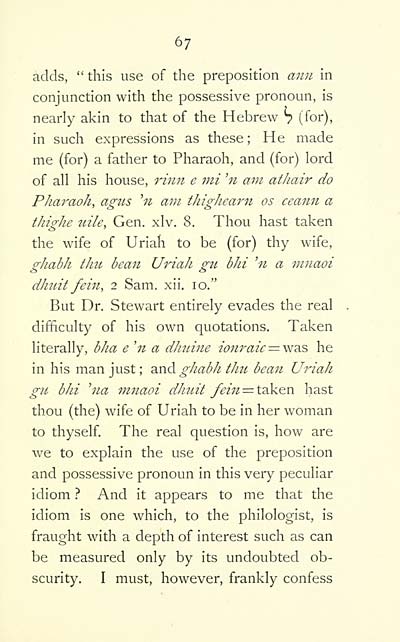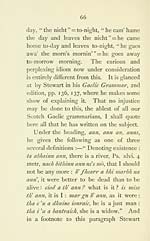Blair Collection > Vestigia celtica
(71)
Download files
Complete book:
Individual page:
Thumbnail gallery: Grid view | List view

67
adds, " this use of the preposition ann in
conjunction with the possessive pronoun, is
nearly akin to that of the Hebrew 7 (for),
in such expressions as these; He made
me (for) a father to Pharaoh, and (for) lord
of all his house, rinn e mi V am athair do
Pharaoh, agus 'n am thighearn os ceann a
thighe tiile, Gen. xlv. 8. Thou hast taken
the wife of Uriah to be (for) thy wife,
zhabh thiL bean Uriah gu bhi 'n a mnaoi
dhuit fein, 2 Sam. xii. 10."
But Dr. Stewart entirely evades the real
difficulty of his own quotations. Taken
literally, bha e 'n a dhuine ionraic = \N^s he
in his man just ; ^nd ghabh thu bean Uriah
gu bhi 'na mnaoi dhnit fein = t2.\iQn hast
thou (the) wife of Uriah to be in her woman
to thyself. The real question is, how are
we to explain the use of the preposition
and possessive pronoun in this very peculiar
idiom ? And it appears to me that the
idiom is one which, to the philologist, is
fraught with a depth of interest such as can
be measured only by its undoubted ob-
scurity. I must, however, frankly confess
adds, " this use of the preposition ann in
conjunction with the possessive pronoun, is
nearly akin to that of the Hebrew 7 (for),
in such expressions as these; He made
me (for) a father to Pharaoh, and (for) lord
of all his house, rinn e mi V am athair do
Pharaoh, agus 'n am thighearn os ceann a
thighe tiile, Gen. xlv. 8. Thou hast taken
the wife of Uriah to be (for) thy wife,
zhabh thiL bean Uriah gu bhi 'n a mnaoi
dhuit fein, 2 Sam. xii. 10."
But Dr. Stewart entirely evades the real
difficulty of his own quotations. Taken
literally, bha e 'n a dhuine ionraic = \N^s he
in his man just ; ^nd ghabh thu bean Uriah
gu bhi 'na mnaoi dhnit fein = t2.\iQn hast
thou (the) wife of Uriah to be in her woman
to thyself. The real question is, how are
we to explain the use of the preposition
and possessive pronoun in this very peculiar
idiom ? And it appears to me that the
idiom is one which, to the philologist, is
fraught with a depth of interest such as can
be measured only by its undoubted ob-
scurity. I must, however, frankly confess
Set display mode to: Large image | Transcription
Images and transcriptions on this page, including medium image downloads, may be used under the Creative Commons Attribution 4.0 International Licence unless otherwise stated. ![]()
| Early Gaelic Book Collections > Blair Collection > Vestigia celtica > (71) |
|---|
| Permanent URL | https://digital.nls.uk/75801196 |
|---|
| Description | Celtic footprints in philology ethics and religion. |
|---|---|
| Shelfmark | Blair.1 |
| Additional NLS resources: | |
| Attribution and copyright: |
|
| Description | A selection of books from a collection of more than 500 titles, mostly on religious and literary topics. Also includes some material dealing with other Celtic languages and societies. Collection created towards the end of the 19th century by Lady Evelyn Stewart Murray. |
|---|
| Description | Selected items from five 'Special and Named Printed Collections'. Includes books in Gaelic and other Celtic languages, works about the Gaels, their languages, literature, culture and history. |
|---|

